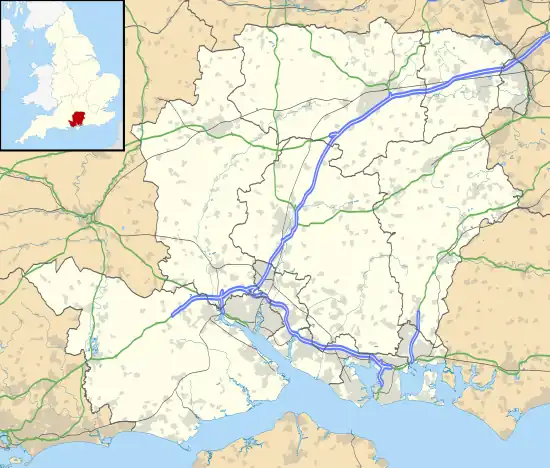Bransgore
Bransgore is a village and civil parish within the New Forest District, Hampshire, England. The village developed in the 19th century when a church and a school were built. It is technically classified as an urban area, although in some respects it still has the picturesque character of a rural English village.
| Bransgore | |
|---|---|
 Shops at Bransgore | |
 Bransgore Location within Hampshire | |
| Population | 4,333 (2001) |
| OS grid reference | SZ1897 |
| Civil parish |
|
| District | |
| Shire county | |
| Region | |
| Country | England |
| Sovereign state | United Kingdom |
| Post town | Christchurch |
| Postcode district | BH23 |
| Dialling code | 01425 |
| Police | Hampshire and Isle of Wight |
| Fire | Hampshire and Isle of Wight |
| Ambulance | South Central |
| UK Parliament | |
Overview
Bransgore is a village and civil parish in the New Forest District of Hampshire. The parish includes the village of Thorney Hill, and the hamlets of Neacroft, Godwinscroft, Beckley, Hinton, and Waterditch.[1] At the time of the last national census of 2011, Bransgore had a total population of 4,238, with just over half being aged between 20 and 64.[2] Bransgore now straddles the border of the newly created New Forest National Park, with the majority of the village being outside the park.
Bransgore has a wide variety of shops including a post office, pharmacy, bakery, greengrocer, hairdresser, and take-away food shops.[3] There are also several pubs/restaurants.[4] Bransgore has a village sports field with a children's playground.[4] The sports field is the location of the Village Fun Day event which is held each summer.[4]
History
The earliest deeds mentioning Bransgore date from the 1730s.[5] The village was called, in 1759, "Bransgoer Common", and in 1817 "Bransgrove".[6] The word "gore" in Middle English means a triangular piece of land.[6] It is uncertain who or what "Bran" refers to.[6]
A local myth is that the name Bransgore came from one of King Alfred's battles against the Danes, Brans from "brains" and Gore from "blood". In the 19th century, Victorian romantics even persuaded the Ordnance Survey to mark on their maps the site of a battle at Bransgore, on the road leading to Sopley.[7] There is unfortunately, no truth in this story, and the name Bransgore does not derive from "brains and gore."[5]

The Crown Inn in Bransgore dates from the 18th century,[8] as does the Three Tuns pub.[9] The church of Saint Mary the Virgin was erected in 1822 as a chapel of ease.[10][11] The church is of brick with stone dressings,[11] with a tower and originally a spire.[12] However, the spire was removed in 1967. The early 16th-century font, which is said to have come from Christchurch, is octagonal, with a monogram J D, perhaps for "John Draper," the last Prior of Christchurch Priory.[11] The ecclesiastical parish of Bransgore was formed in 1875 from parts of Christchurch and Sopley.[11][13] Henry William Wilberforce, son of William Wilberforce (known for his campaign against slavery), was once the vicar of Saint Mary's church.[14] He founded a school in the village in 1841.[14] In 1895, a National school was built accommodating 174 pupils,[15] which is now the Primary School.[16]
All Saints church near Thorney Hill is a grade I listed, Edwardian Baroque church, built in 1906.[17][18] Designed by Detmar Blow and constructed from Caen stone and rendered brick. Inside are wall paintings by Phoebe Anna Traquair (1852–1936) of Te Deum featuring local people.[18]
Between 1894 and 1974, Bransgore was part of the civil parish of Christchurch East.[19] Following the county boundary changes of 1974, Christchurch East parish was split into the parish of Bransgore (Hampshire) and the parish of Burton (Dorset).[19]
In 2022, the building of 100 homes in a flood prone area near Derrit Lane in Bransgore is set to be approved despite many objections.[20]
References
- Bransgore Parish Council
- "2011 census". ONS Neighbourhood Statistics. Office for national Statistics. Retrieved 26 January 2017.
- Bransgore Virtual High Street, newforest-online, retrieved 12 September 2011
- Things to do in Bransgore, newforest-online, retrieved 12 September 2011
- A. T. Lloyd, J. E. S. Brooks, (1996), The History of New Milton and its Surrounding Area, Centenary Edition, page 14
- Old Hampshire Gazetteer – Bransgore
- See for example: Ordnance Survey (1919) Bournemouth and Purbeck map
- "Hampshire Treasures – Bransgore, page 28". Archived from the original on 5 June 2011. Retrieved 14 August 2011.
- Three Tuns Public House, Bransgore, British Listed Buildings
- St Marys Archived 24 July 2013 at the Wayback Machine, bransgore.org
- Victoria County History, (1912), A History of the County of Hampshire: Volume 5, Christchurch, pages 101–110
- Samuel Lewis (editor), (1848), A Topographical Dictionary of England, pages 347–350
- The Parish Of Bransgore Archived 24 July 2013 at the Wayback Machine, bransgore.org
- The History of Bransgore, newforest-online, retrieved 12 September 2011
- "Hampshire Treasures – Bransgore, page 25". Archived from the original on 5 June 2011. Retrieved 12 September 2011.
- Bransgore Primary School
- All Saints Archived 24 July 2013 at the Wayback Machine, bransgore.org
- "Church of All Saints". British Listed Buildings. Retrieved 6 June 2011.
- Christchurch East CP, www.visionofbritain.org.uk
- "100 homes set to be approved – despite fears plans would "destroy" village". Bournemouth Echo. Retrieved 10 March 2022.
- "British towns twinned with French towns". Archant Community Media Ltd. Archived from the original on 5 July 2013. Retrieved 11 July 2013.
